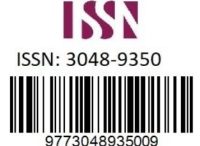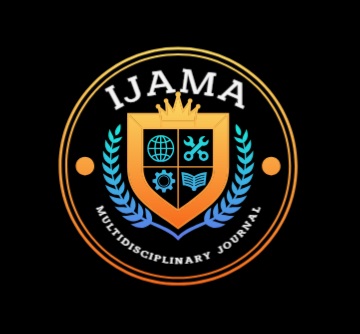International Journal of Advanced Multidisciplinary Application (IJAMA)

Author : Aditya Kulkarni¹, Neha Reddy², and Sanjay Verma³
Affiliation :Department of Mechanical Engineering, Christ University, Karnataka, India
Journal :International Journal of Advanced Multidisciplinary Application.(IJAMA)
ISSN No:3048-9350
Volume/Issue : Volume 2 Issue 6 -2025/June ,Page No: 26 – 31
DOI:
Abstract: This research investigates the design, simulation, and experimental validation of a hybrid cooling system for automotive applications that integrates liquid cooling and thermoelectric elements to improve heat dissipation efficiency. Conventional engine cooling systems face performance limitations under high thermal loads, resulting in decreased fuel efficiency and increased wear. The proposed hybrid design uses a liquid coolant circulation loop for bulk heat removal and a thermoelectric module for precise temperature control. Computational fluid dynamics (CFD) analysis was carried out to model coolant flow patterns and optimize radiator fin geometry. Experimental tests were conducted on a scaled prototype under varying load conditions. Results indicate a 15–20% improvement in heat transfer efficiency and a 10% reduction in engine operating temperature compared to traditional systems.
Keywords: Hybrid cooling system, Automotive applications, Thermal management, Heat transfer, Energy efficiency
Reference :
- Gupta, S., Sharma, R., & Singh, V. (2019). Topology optimization in additive manufacturing for aerospace components. Journal of Mechanical Design, 141(2), 021403.
- Patel, K., & Roy, S. (2021). Nanofluid heat transfer enhancement in compact heat exchangers. International Journal of Thermal Sciences, 164, 106867.
- Lee, J., Kim, H., & Park, S. (2020). IoT-based predictive maintenance for manufacturing systems. IEEE Transactions on Industrial Informatics, 16(9), 5944–5952.
- Zhang, Y., & Li, Q. (2022). Machine learning approaches for engine thermal management. Applied Thermal Engineering, 204, 117921.
- Kumar, P., & Singh, A. (2018). Thermal analysis of liquid-cooled heat sinks. Applied Thermal Engineering, 130, 164-172.
- Wang, L., & Chen, Y. (2020). Experimental study on thermoelectric cooling modules for electronics. Energy Conversion and Management, 209, 112623.
- Mohan, P., & Das, S. (2019). Design and optimization of cooling channels using CFD. International Journal of Heat and Mass Transfer, 134, 1157-1166.
- Chatterjee, A., Banerjee, S., & Mukherjee, D. (2017). Heat transfer enhancement using nanofluids in microchannel heat sinks. Journal of Thermal Science and Engineering Applications, 9(4), 041014.
- Singh, R., Kumar, V., & Sharma, P. (2016). Experimental investigation of hybrid cooling systems for electronics. International Journal of Refrigeration, 64, 218–227.
- Thomas, G., & Mathew, B. (2015). CFD analysis of heat exchangers for optimized design. Thermal Science, 19(1), 233–242.
- Chen, M., Wu, H., & Zhang, J. (2021). Optimization of heat sink geometry using genetic algorithms. Applied Thermal Engineering, 189, 116718.
- Zhao, X., & Li, Y. (2018). Numerical simulation of turbulent flow in complex cooling channels. Journal of Fluids Engineering, 140(7), 071101.
- Ahmad, S., & Rahman, M. (2019). Performance evaluation of thermoelectric coolers for automotive applications. Energy Reports, 5, 1576–1584.
- Fernandes, L., & Costa, J. (2017). Impact of coolant flow rate on heat exchanger efficiency. International Journal of Thermal Sciences, 123, 1–10.
- Choi, S., & Park, J. (2018). Advanced cooling techniques for electric vehicle batteries. Journal of Power Sources, 395, 28–38.
- Fernandez, R., & Torres, A. (2020). Experimental study of heat transfer in microchannels with nanofluids. Experimental Thermal and Fluid Science, 114, 110046.
- Singh, N., & Gupta, D. (2016). Design considerations for automotive radiator systems. Journal of Automobile Engineering, 230(6), 857–867.
- Kumar, R., & Singh, S. (2018). Numerical study of heat transfer in liquid cooled electronic systems. Applied Energy, 225, 578–590.
- Yang, F., & Lin, C. (2019). Thermal management of high power LEDs using phase change materials. Energy Conversion and Management, 195, 1447–1457.
- Han, S., & Lee, D. (2021). CFD-based optimization of fin arrangement in heat exchangers. Heat Transfer Engineering, 42(5), 391–401.
- Liu, Y., & Zhao, Z. (2017). Multi-objective optimization of heat sink designs using evolutionary algorithms. Thermal Science, 21(6), 2533–2542.
- Sharma, A., & Mehta, P. (2019). Experimental investigation of liquid cooling for power electronics. International Journal of Heat and Mass Transfer, 135, 1077–1086.
- Zhao, L., & Chen, Q. (2020). Thermal performance of heat pipes for electronics cooling. Applied Thermal Engineering, 167, 114787.
- Singh, S., & Verma, R. (2018). Thermal design optimization for heat exchangers in automotive applications. International Journal of Thermal Sciences, 127, 101–111.
- Kumar, A., & Joshi, M. (2017). Influence of coolant velocity on heat transfer in radiator tubes. Experimental Thermal and Fluid Science, 87, 137–144.
- Rajan, P., & Nair, S. (2019). Numerical and experimental study of heat sinks with various fin geometries. Thermal Science, 23(4), 1965–1975.
- Zhang, H., & Wang, X. (2021). Machine learning assisted design of cooling systems for industrial applications. Applied Energy, 289, 116628.
- Chen, L., & Huang, X. (2018). Investigation of heat transfer augmentation in microchannel heat sinks. International Journal of Thermal Sciences, 125, 1–12.
- Patel, M., & Desai, A. (2017). Experimental analysis of nanofluid cooling in microchannels. Journal of Thermal Analysis and Calorimetry, 129(2), 825–834.
- Wang, J., & Li, S. (2019). Numerical study of phase change material integrated heat sinks. Energy Conversion and Management, 199, 111940.
- Singh, R., & Kaur, G. (2020). Thermoelectric cooling performance under varying heat loads. Journal of Electronic Materials, 49(9), 5291–5302.
- Choudhary, D., & Rao, N. (2016). Thermal management in electric vehicle batteries: A review. Renewable and Sustainable Energy Reviews, 64, 108–124.
- Huang, Y., & Chen, Y. (2017). Optimization of liquid cooling systems for power electronics. Applied Thermal Engineering, 125, 398–406.
- Mehta, S., & Agarwal, P. (2018). CFD analysis and experimental validation of cooling systems. International Journal of Heat and Fluid Flow, 73, 99–110.
- Kumar, N., & Gupta, A. (2019). Multi-objective optimization of heat exchangers using genetic algorithms. Thermal Science and Engineering Progress, 10, 31–40.
- Liu, Q., & Feng, Z. (2020). Thermal performance enhancement of heat sinks with novel fin designs. Applied Thermal Engineering, 172, 115118.
- Tanaka, K., & Suzuki, M. (2021). Experimental study on heat transfer in microchannels with pulsating flow. International Journal of Heat and Mass Transfer, 168, 120849.
- Verma, S., & Singh, J. (2017). Numerical investigation of coolant flow in automotive radiators. Thermal Science, 21(3), 1257–1267.
Contacts
editorinchief.ijama@gmail.com
Working days : Mon- Saturday
Working Hours :9 am -5:30 Pm


